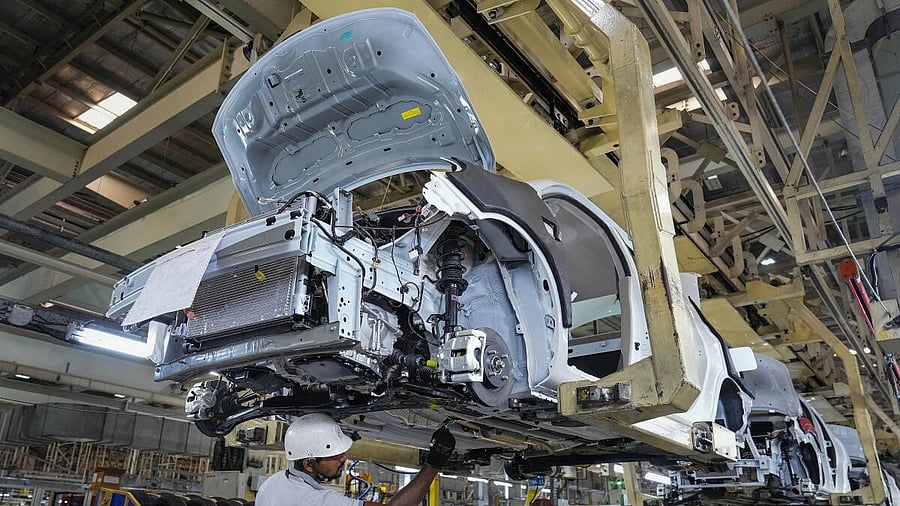
Employees work in an assembly line at a car-manufacturing factory. Image for representation.
Credit: iStock Photo
New Delhi: The decision to impose high tariffs on Indian goods by the US presents near-term challenges for the auto component makers, underscoring the importance of enhancing the sector's competitiveness and exploring new and diversified markets, industry body ACMA said on Thursday.
On August 6, the US announced an additional 25 per cent tariff on all Indian imports, on top of an existing 25 per cent duty, taking the total to 50 per cent from August 27.
"The recent decision by the US to impose higher and additional tariffs on certain imports from India, including auto components, underscores the shifting landscape of global trade," ACMA President Shradha Suri Marwah said in a statement.
While this development presents near-term headwinds, for Indian exporters, it also underscores the importance of enhancing our sector's competitiveness, strengthening value addition, and exploring new and diversified markets, she added. The US is a significant trade partner of the Indian auto components industry.
In FY 2024-25, it accounted for 27 per cent of the $22.9 billion auto components exports from India and 7 per cent of the $22.4 billion imports of auto components into India.
ACMA is confident that the long-standing and strategic trade relationship between India and the US will serve as a strong foundation for continued dialogue and resolution, Marwah noted.
"We appreciate the proactive stance of the Government of India in addressing the issue and remain hopeful that bilateral engagement will lead to constructive outcomes," she added.
At the same time, this development reinforces the importance of building greater self-reliance, enhancing domestic value addition, and accelerating innovation within the sector, Marwah said.
ACMA remains committed to working closely with the government and industry stakeholders to ensure India's auto component industry remains competitive, resilient, and future-ready, she stated.
The Automotive Component Manufacturers Association of India (ACMA) has over 1,100 manufacturers contributing more than 90 per cent of the auto component industry's turnover in the organised sector.
In FY2025, the combined turnover of the auto component industry stood at $80.2 billion, with $22.9 billion in exports and a trade surplus of over $450 million.
EY India Partner & Automotive Tax Leader Saurabh Agarwal stated the recent imposition of higher US tariffs presents a significant, albeit anticipated, challenge for Indian auto component manufacturers.
While a 25 per cent duty was already in effect for the sector since May 3, 2025, and the additional reciprocal 25 per cent tariff effective August 2025 is not to apply to the majority of the automotive sector (as the majority of the automotive sector is excluded from reciprocal tariffs).
However, even the initial 25 per cent duty imposed on the automotive sector by the US fundamentally alters the sector's competitive landscape for US exports in the short term.
"This means we need to quickly adjust our plans to protect our strong export growth, especially since the US was one of our biggest markets for auto parts in FY2025," he noted.
To lessen this impact, Indian manufacturers should actively look into setting up some production closer to the US, he added.
Countries like Mexico and Canada, thanks to the USMCA trade agreement, allow Indian parts to enter the US without extra taxes if they meet certain local content rules, he said.
This makes them attractive places to move part of our manufacturing to serve the US market, Agarwal said.
At the same time, it's crucial to aggressively expand into other markets, he noted.
"The new trade agreement with the UK, signed recently, gives us immediate tax-free access for most auto parts, which is a big advantage. We also need to push hard for a quick trade deal with the European Union, using the success of the UK agreement to help us," he said.
Beyond that, the growing demand in developing countries in Asia, Africa, and Latin America offers huge potential for long-term growth, he said.
"By focusing on these new markets and making specialised, high-value parts that aren't tied to traditional engines, we can turn this challenge into a chance to become even more competitive globally and achieve lasting growth," Agarwal said.